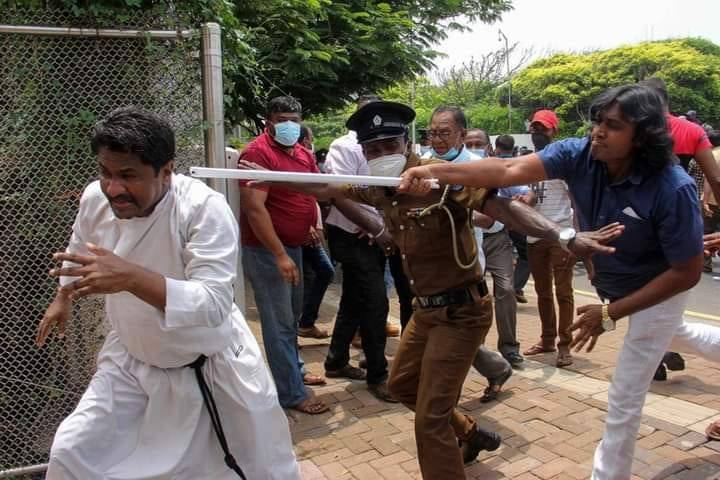Sri Lanka’s economic crisis: A blame game

Former minister Lakshman Namal Rajapaksa, son of the former Prime Minister Mahinda Rajapakse has blamed the wrong decisions of the government officials for the crisis in Sri Lanka, which is under facing an economic crisis, reported BBC.
The BBC reporter asked Namal Rajapakse, “I was here in December and I spoke to quite a few economists and at that time they said there was no other option than to go to International Monetary Fund (IMF). And then Sri Lankan rupees had been floated because people were sending money from abroad through illegal channels. But why the government did not listen to that advice?”
Namal Rajapakse answered, “It also goes back to the officials who take decisions because economic decisions cannot be taken by politicians. The government or the finance minister and the secretary particularly acted upon advice given to him by certain officials. And that is admitted by the current finance minister in the parliament that certain officials gave the wrong advice.”
Questions are rising about the contribution of the politicians who are blaming officials for the crisis.
The Bar Association of Sri Lanka (BASL) is now meeting political parties to discuss solutions to the economic and political crisis.
On May 9, the BASL said it met with President Gotabhaya Rajapakse and explained the need for a National Unity Government.
At the meeting, the BASL members had expressed concern about the decision to declare a state of emergency.
President Gotabhaya has said that he would consider the recommendations of the Bar Association of Sri Lanka. But he had said that this would be done under the Constitution.
The BASL also met with former Prime Minister Mahinda Rajapakse at Temple Trees the same day afternoon. The Bar Association of Sri Lanka had outlined the 13 points of the proposal on the way forward for Sri Lanka.
Their main recommendations include, the government introducing the 21st amendment to the Constitution by repealing the provisions of the 20th amendment and resolving the 19th amendment, abolishing the executive presidency.
The executive presidency is to be replaced by a parliamentary form of government whether the prime minister as the head of government and the cabinet of ministers is accountable to parliament, establish an interim government of National Unity, consisting of 15 cabinet ministers.
The Bar Association of Sri Lanka met with Sr Lanka Freedom Party and Samagi Janapala Wegaya that day morning to discuss the 13-point proposals.
Members of the 11 other parties were also present. There former President Maithripala Srirsena said that they had discussed excessively with them the political situation and the solutions to the economic crisis.
“We also discussed how the Constitutional amendments could be made. We held these talks to see how we could make these changes to conduct a parliamentary election and decide on the presidency. The discussions were successful,” said Srirsena.
The Bar Association of Sil Lanka held its second meeting with Samagi Jana Balawegaya (SJB).
There the leader of SJB said, “We have put forward the 21st amendment to the Constitution to abolish the executive presidency. The Bar Association had also submitted its proposals. I think the bar association is to meet the president; we must know the president’s responses. What’s not important for politicians to credit? We have a certain degree of social responsibility. We have a national responsibility as well. We must reveal the people from their worries. We will come ourselves to that.”
A journalist raised a question from the Opposition Leader after this meeting, “What commitment you would make? You are planning to bring the 21st amendment. But shouldn’t a new government be appointed? In reply to that question, he said that for the country to move forward we believe the 21st amendment should be enacted. The country has found itself in this situation because of the executive presidency that had features of dictatorship.
“Abolishing is an important step to resolve people’s problems. We are ready to undertake a progressive journey by taking those steps together with the Bar Association’s proposals,” he said.
Reacting to these developments, Ed Rowlands, a civilian, said, “The audacity and stupidity of the Rajapaksa and their supporters are unbelievable. Talking about putting your head in the sand and pretending nothing is happening is the work of an arrogant and out-of-touch reality mob. Easy for Namal Perera to blame the public service personnel who they appointed for bad advice and take the cowards' way out without taking responsibility for their collective decisions. God Bless Sri Lanka.”
Another civilian Alex Green, “Millions of Sri Lankans are suffering from hunger and poverty and sadly will continue to do so because the Rajapaksa’s family of thieves has robbed seven billion Dollars from the Sri Lanka coffers in the past two years.” - Hemantha Perera, RVA Sri Lanka
Radio Veritas Asia (RVA), a media platform of the Catholic Church, aims to share Christ. RVA started in 1969 as a continental Catholic radio station to serve Asian countries in their respective local language, thus earning the tag “the Voice of Asian Christianity.” Responding to the emerging context, RVA embraced media platforms to connect with the global Asian audience via its 21 language websites and various social media platforms.














